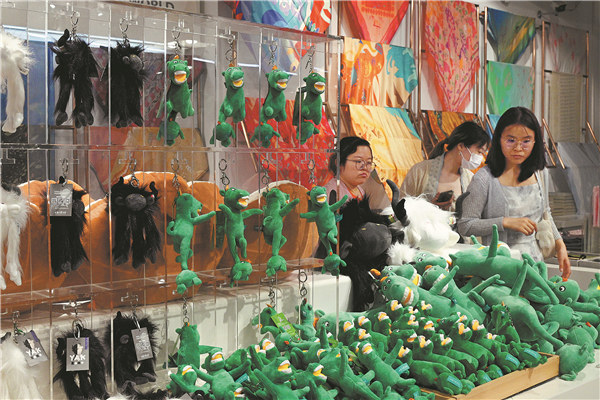

By popular demand
Some cultural and creative products, however, have proved more popular with cultural travelers.
In 2023, the National Library of China in Beijing launched a pillow shaped like its collection of Yongle Dadian, the world's first encyclopedia, which was completed in 1408 after being commissioned in 1403 by Emperor Yongle of the Ming Dynasty (1368-1644).
Since then, the pillow has recorded brisk sales, with some buyers even posting comments saying it had helped cure their insomnia.
In 2019, the national library launched over 1,500 cultural and creative products themed around ancient books, which have brought in over 60 million yuan in total revenue.
The Beijing Municipal Cultural Heritage Bureau said several museums under its jurisdiction, including the Capital Museum and the Grand Canal Museum of Beijing, have established cultural and creative spaces.
The revenue from cultural and creative products sold in museums across Beijing exceeded 200 million yuan in 2023, according to local authorities.
The recent 2024 Cultural and Creative Industry Report released by the Shanghai-based Mob research institute showed that 95.5 percent of consumers surveyed are willing to purchase such products.
The two main reasons consumers buy cultural and creative products are to display them in collections or for daily use, the report said. Buyers pay close attention to the design, price and variety of these products, it added.
E-commerce platforms have surpassed traditional brick-and-mortar stores to become the main way the products are purchased.
Video platforms like Bilibili, Douyin, and Kuaishou are popular sources for consumers to obtain information about the products, and genuine customer reviews help buyers make quicker purchasing decisions, the report said.
The ongoing Civilization of Ancient Egypt exhibition at the Shanghai Museum, for instance, has created a buying spree. At the museum's flagship store on Alibaba's Tmall, Egyptian cat keychains, tote bags bearing the exhibition logos, and mummy pendants are in high demand.
Many of these products have experienced supply shortages since the exhibition started on July 19. The online store offers more than 200 cultural products related to the exhibition and some have had to be restocked on a daily basis since August, according to store staff.
The Gansu Provincial Museum struck gold in July when it rolled out fluffy toys in the shape of broccoli, mushrooms, crab sticks, meatballs, and rice cakes to celebrate malatang, a spicy hot pot considered a local specialty.
In the first week of August, the museum said its Tmall store saw a 343 percent year-on-year increase in product sales.